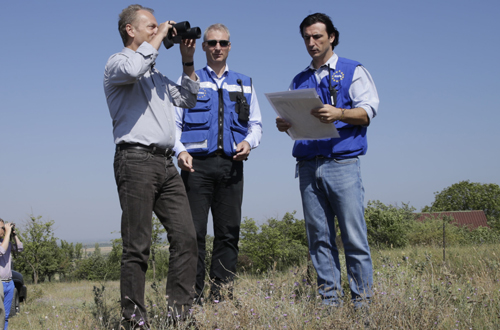| EU’s Tusk Hails Tbilisi’s ‘Responsible Reaction’ to Russia’s ‘Provocations’ |
| Civil Georgia, Tbilisi / 21 Jul.'15 / 16:48 |

European Council President Donald Tusk looks through binoculars while visiting breakaway South Ossetian boundary line as observers from the EU Monitoring Mission (EUMM) brief him about situation on the ground, July 21, 2015. Photo: European Council
President of the European Council Donald Tusk said he appreciates the “responsible reaction” by the Georgian government to Russia’s “clear provocation”, involving putting “separation infrastructure” along the administrative boundary line with the breakaway South Ossetia.
Tusk made the remarks after meeting with Georgian PM Irakli Garibashvili on July 21, following his trip to the South Ossetian administrative boundary earlier the same day, where new demarcation signposts have been placed recently by the Russian troops in the close vicinity of Georgia’s major east-west highway and in the area where mile-long section of the BP-operated Baku-Supsa oil pipeline runs.
“I have seen how the infrastructure of separation continues to be put in place along the boundary,” Tusk said after the meeting with the Georgian PM.
He reiterated his earlier remarks made after the meeting with President Giorgi Margvelashvili on July 20 that the recent installation of new demarcation signposts is “a clear provocation”, which does not contribute to efforts to stabilize the situation.
“Let me say Mr. Prime Minister that I really appreciate your very responsible reaction; I think it’s very important not only for Georgia, but for the whole region and whole Europe to manage this problem responsibly and with cold blood,” Tusk said.
Tusk suggested that the goal of those “provocations” is to trigger an “overreacted” response from Georgia.
“It is very important for us to be tough, but also very responsible,” he added.
PM Garibashvili expressed “concern” over the recent developments along the administrative boundary and described it as “a provocation.”
“The Georgian government met it firmly, but calmly,” he said. “Our goal is not to yield to these provocations and not to give anyone any pretext for escalation.”
The European Council President said that Georgian domestic politics were also discussed at the meeting with the Prime Minister.
“I have stressed that all parties must do their utmost to avoid politics of extremes. Legal process should be free from political motivation; this matters first place for Georgia, but also for our relations.”
Tusk, who met representatives of the opposition UNM and Free Democrats parties in Tbilisi on July 21, also noted the importance of making reform processes “as inclusive as possible.”
On visa liberalization with the EU, Tusk said after the meeting with the PM that Georgia made good progress and “if this progress continues” and if the next technical report by the European Commission before the end of this year is positive “I think you will be able to successfully finalize this process in the near future.”
“Successful completion of visa liberalization dialogue with the EU is very important for us,” PM Garibashvili said. “I told Mr. Tusk that the Georgian government is fully motivated to fulfill all the commitments undertaken under the Visa Liberalization Action Plan,” Garibashvili said, adding that implementation of this plan is carried out with “success, without any delays.”
“We have actually fulfilled all the commitments in respect of VLAP [Visa Liberalization Action Plan] and we expect that by the end of this year there will be positive political decision in this regard by the European Union,” the Georgia PM said.
Meeting with Georgian troops deployed under the EU Operations in the Central African Republic pic.twitter.com/rFTK5T6Rut
— Donald Tusk (@eucopresident) July 21, 2015During the visit Tusk also met Georgian troops, who were part of the EU military mission in the Central African Republic.
“Your hard work and sacrifice is truly appreciated in the EU,” Tusk said while addressing the Georgian troops. “Thanks your courage, professionalism and dedication Georgia is maybe the best example of the international solidarity in the whole world.”
156 Georgian troops served in CAR in a period between June and December, 2014 and 85 Georgian soldiers were deployed in the country in December, 2014-March, 2015.
In May, 2015 the Parliament approved sending of five Georgian officers to the Central African Republic (CAR) and a logistics officer to Mali to be part of EU advisory and training missions in those countries.
